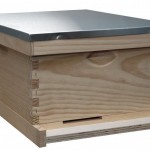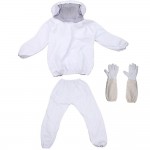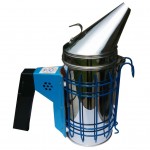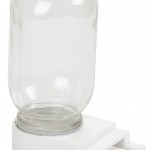If you purchase an independently reviewed item through our site, we earn an affiliate commission. Read our affiliate disclosure.
Beekeeping can be a rewarding and very fulfilling venture. You can successfully start and run a beekeeping business even without prior experience in business or in beekeeping – as long as you are willing to learn a lot of things very quickly. Potential beekeepers always ask themselves the question of cost. It is natural that you want to know what is the cost of beekeeping and how much you will need to start the business, to see it through its infancy until it turns a profit.
Even though cost is the main factor that determines whether you will go into beekeeping or not, there is never an exact answer to the question. This can be attributed to the fact that various variables dictate how much you will spend. These include the quality of the materials, types of bees, size of the hive, and whether you will craft it yourself or you will buy the hive. In this article, we’ll discuss the cost of beekeeping and how to keep the cost down.
Monetary Cost of Setting Up
The initial monetary cost of setting up includes all the money you will spend on equipment, tools, registering your business, ensuring compliance with laws and regulations, and marketing your beehive products. If you do branding, the monetary cost of beekeeping includes the money you use in branding. Some beekeepers also set up a website for branding and marketing purposes.
The exact figure of the amount of money needed for starting a beekeeping business varies. Different items may be available at varying prices depending on where you are located. The laws and regulations of different locales vary, and so does the cost of ensuring you are compliant. Additionally, fees charged for business registration and accounting services also vary by the provider of the service. Arbitrarily, you should have $700 – $1,000 to spend in the first year of beekeeping. The bulk of it will be used up in the initial stages of setting up your beekeeping business. Some beekeeping businesses have been set up with less money spent, but it pays to have extra cash just in case you need something in a hurry.
During setup, you will be buying a lot of items and paying for assistance with the paperwork needed to legally set up the business on paper. Register the business you are setting up and get a bank account for it that is separate from your personal account. Remember, your beekeeping business is only truly underway once you have a beehive with a honey bee colony inside it. You may take all the time you want to prepare before installing honeybees in the beehive, by buying the necessary equipment and books.
Once you have set up your beekeeping business, there will be maintenance and management costs to finance. Getting through the first year and a half is important. Once the beekeeping operation is more than 1-year old, you might be able to get some beehive products. Selling these off brings you some well-needed income to offset some of the costs you will be incurring then. The real yields of your beekeeping are realized in the second year so that too is an important milestone to look out for.
Equipment and Tools
The equipment and tools needed for beekeeping are best bought at the initial stages of setting up the business. You could buy the important stuff before you set up the first honey bee colonies you have in their beehives. The rest of the equipment and tools can be bought shortly after so that it is available at hand when you need it. For example, you can put off buying a honey extractor for the late stages of the business setup, since you do not need it until there is a honey harvest coming in. The major equipment and tools you need are the full beehive, hive tool and protective gear.
The purchase of equipment and tools eats up the most amount of money in setup. The good thing about this equipment and tools is that they are one-time costs. With proper use, maintenance and purchasing of quality items, the equipment and tools will last many years. You should see the acquisition of equipment and tools as one of the major investments you make in the beekeeping business. The other major part of the investment is of course the honey bee colony. If you have some money left over after the purchase of equipment, it would be great to construct a shed or other enclosure where you store your beekeeping tools and equipment when they are not in use.
Beekeepers with freshly started beekeeping operations should take a lot of care to avoid diseases of honey bees. This applies to pests and parasites of honey bees too. In the first few years of your beekeeping, you will be better off without having to deal with these problems. They can devastate or even wipe out the entire honey bee colony. All the same, it is great to have at hand some treatments for pests, parasites and diseases. Varroa mite and hive beetle control should be your top priority. Treatment equipment for these two major honey bee problems will set you back some USD $100 at most.
Required Items
Honey Bees Package
Firstly, read our article on where to buy bees. Starting out, you’ll need honey bees weighing about 1.35 kg (3 pounds). Prices will vary depending on who you’re buying it from. You may get a better deal buying bees from local beekeepers.
Queen Bee
You can purchase the queen bee along with the honey bees package. Prices will vary, but the cost usually includes a queen excluder.
Beehive Kit
You’ll need at least one bee hive kit and prices will range depending on the specification of the kit itself. Bee hive kits will include the foundations, frames, and supers, and most will feature an entrance reducer. Click here to check the prices beehive kits on Amazon.com.
Beekeeper Suit
You’ll need one beekeeper suit. You can purchase the components of the suit separately, but it’s recommended to buy the full suit for utmost protection. Click here to check the prices of beekeeper suits at Amazon.com.
Beekeeping Gloves
You’ll need one pair. You can also just purchase the full beekeeper suit, which includes the gloves. Click here to check the prices of beekeeping gloves on Amazon.com.
Bee Smoker
You’ll need one bee smoker and these are generally not very expensive. Click here to check the prices of bee smokers on Amazon.com.
Bee Smoker Fuel
Bee smokers run on fuel so you’ll regularly need to restock. Click here to check the prices of bee smoker fuel on Amazon.com.
Alternatively, you can look around your surroundings for anything that could be used as fuel, such as hay or dry long grass.
Bee Hive Feeder
There are different types of feeders and each has their advantages and disadvantages depending on the season. You can get by with only one, however for best results, you’ll need three, one for spring, one for summer and one for winter. Click here to check the prices of bee hive feeders over at Amazon.com.
Hive Tool
You’ll need only one. Click here to check the prices of hive tools over at Amazon.com.
Honey Harvesting Equipment
Honey harvesting equipment includes the honey extractor, the uncapping knife, uncapping fork, the honey strainer, the bee brush, the double uncapping tank and the bottling bucket. You’ll need one of each. Click here for more information on honey harvesting equipment.
Business Registration
A beekeeping business is an agricultural venture. You should register it with the government and set it up as a limited liability company if possible. Having the separation saves your personal assets in case you get sued for something. Additionally, the separation makes sure that the business is easy to analyze for profitability. It is very likely that you are going to incur some costs when going about the process of registering the business. Take steps to keep the costs low by doing what you can, before hiring someone to help you with registering the business.
After registration, make sure to open bank accounts and get credit cards for the business. Again, separating the business account and your personal account helps for easy accounting and protection of your personal funds. There are companies and individuals that can provide these business registration and setup services at a low cost. You can hire them, or do everything yourself and save the money for more important things. If you cannot afford the cost of registering the business at first, you can do it later in the practice, but do not delay it too much and get into trouble with the authorities.
With business registration, it pays to set up a website early on. The online presence you establish early on in the infancy of the business can be small but it pays later on. A business website for your beekeeping venture will help you with branding and marketing functions. The cost of acquiring a domain, hosting services and website setup is not too high. Once you have a functioning website, you can have some assistance to populate it with content and run social media for you. Learn something about the website so that you can update it going forward and lose the hired help.
Laws and Regulations Compliance
Beekeeping comes with a certain level of risk that is higher than other small businesses. Honey bees stinging people and animals are a real concern for everyone. The authorities in different locations and jurisdictions have come up with laws and regulations that govern beekeeping. These laws and regulations are aimed at ensuring the safety of animals and people, including the beekeeper. It is important that you ensure full compliance with these laws when they apply to your apiary location. Failure to do so attracts fines and possible closure of your young beekeeping business. Often, the cost of obtaining compliance with the authorities is very small. Find out the laws governing beekeeping in your area and see that you comply with them even before notifying the authorities and maybe acquiring a compliance certificate.
Safety in beekeeping is important so that you avoid lawsuits from people who have been stung by your honey bees, or whose animals have been stung. Location selection and setup of the apiary is a great first step towards ensuring this safety. A hedge around your apiary does a good job ensuring honey bees fly upwards away from people and animals as they leave the apiary to go forage for resources. Secondly, choose a location for the apiary that is not near footpaths and routes used by people and animals. Third, facing the entrance of beehives away from where people and animals pass will save you a lot of trouble in your beekeeping practice. For urban beekeepers, consider placing your beehives on the rooftops, rather than on the ground.
Sometimes, you are not sure if you are compliant with all the necessary laws and regulations. Despite your best efforts, something might escape your attention. Do not be worried about this. Once you notify the authorities, they are likely to send a compliance officer around to your apiary. If there is anything you have not done, the compliance officer will let you know. The laws and regulations put in place are not punitive or prohibitive to beekeeping. They do not aim to stop you from going into beekeeping but rather to make sure you are practicing safe beekeeping.
Time Spent Beekeeping
Beekeeping will take up your time. It may not be a lot of time, but this is a cost many people do not account for when they are going into beekeeping. This includes the time you spend researching beekeeping itself or finding out information that is important for your business. Once you have started beekeeping, hive maintenance and other activities will take up your time. Preparing the equipment such as frames needed in the beekeeping operation takes time too. Beekeepers that build their own equipment such as beehive boxes instead of buying them take up more time getting everything ready.
As the owner of the beekeeping business, you should log the time spent in beekeeping. You can look at the total time spent in beekeeping at the end of the year and see if the operation would be able to pay for the hours put in. Hired help may bill you against the time spent assisting you in the business, so make sure to add up all those hours and how much you are charged.
Normally, the owner of the beekeeping operation largely donates their time to the business. With time, you can be paid by the business for the time you spend attending to beekeeping affairs and matters.
Records in Beekeeping
Keep records of all incoming and outgoing cash flows in your beekeeping business. This is only going to cost you a records book that you will use for many years anyway. The more detail you have in the records book, the better. You can also keep a record of your observations and activities for the first few years of your beekeeping. The record will help you keep track of how the various honeybee colonies are doing, and how your activities impact their well-being.
Properly kept records in a beekeeping business are useful for the determination of the profitability of the beekeeping operation. With good records, you can easily tell if your business has grown, stagnated or shrunk at the end of your beekeeping year. As mentioned earlier, do not beat yourself up if you are not profitable in year one of your beekeeping business. Most beekeeping businesses start turning profits in their second year.
Marketing of Beekeeping Products
With a product, there must be marketing efforts by the beekeeper. As such, you will incur a cost when marketing your beehive products. The cost incurred varies by the type of marketing activities you carry out. With a website and social media setup, marketing online is easy and not costly. It is advised for most small businesses. As your beekeeping business grows, you can then venture into other large-scale marketing activities. Other small and low-cost marketing avenues you can explore are beekeeping clubs, flea market sales and exhibitions of agricultural and allied products.
Marketing of beehive products is closely lined with branding. Have consistent and attractive branding of your beehive products to make them easy to sell. Additionally, price the products well to compete with other beehive products in the market. You do not have to undercut all other sellers of beehive products. At the same time, find a balance of price so that you are attractive with your prices but you make enough money from the products to make the business profitable. Do not sell your stuff at rock-bottom prices just to move the products, and find yourself dipping into your pocket again to keep the beekeeping business going.
The money you raise from selling your first few harvests of beehive products is often best put back into the business. It helps you grow faster, be more stable in the beekeeping business and reach more markets for your products. Any profits that are put back into the business are taken as capital just like the money you invested in the business when starting it.
The Total Cost of Beekeeping
When you add up the cost of the beehive and its tools and accessories, you will realize that beekeeping is an affordable venture when compared to the benefits you will reap in the long run. Alternatively, you can construct your own bee hives and possibly save on cost. However, this will not be possible if you don’t have excellent woodworking skills, or if you do not know a woodworker who can do it for you.
Even though it might take a long to build your own beehive, it is always gratifying in the end knowing you built it yourself. If you are serious about building it from scratch, then it is wise to purchase all the bee hive pieces in one order.
If you want to get everything at once, then you should consider purchasing a beekeeping starter kit since this option is quick and easy and has everything you need to get you up and running.
 BeeKeepClub Resources and Guides for Beekeepers
BeeKeepClub Resources and Guides for Beekeepers








[…] Honeybees receive advantages the financial system thru higher crop yields, lowered manufacturing prices, and aggressive costs in meals provides to […]